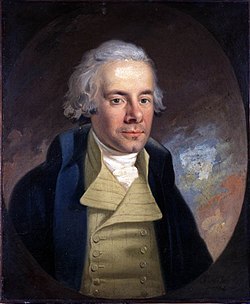William Wilberforce Quote
We have different forms assigned to us in the school of life, different gifts imparted. All is not attractive that is good. Iron is useful, though it does not sparkle like the diamond. Gold has not the fragrance of a flower. So different persons have various modes of excellence, and we must have an eye to all.
William Wilberforce
We have different forms assigned to us in the school of life, different gifts imparted. All is not attractive that is good. Iron is useful, though it does not sparkle like the diamond. Gold has not the fragrance of a flower. So different persons have various modes of excellence, and we must have an eye to all.
Related Quotes
I won't compete with anybody. I love to compete with my own body. When God closes a door against me, I should not attempt to bang on it. And if God gives me a key to open a door, I should not misuse t...
Israelmore Ayivor
Tags:
abuse, aim high, big dream, close, compete, competition, destiny, dream, excellence, food for thought
It has always been simple, but making it hard was always your way of avoiding pain. If you want to change your life, you have to change what you are doing. It wasn't his fault, her fault, their fault...
Shannon L. Alder
Tags:
being different, best friends, betrayal, career, caring, caring too much, choices, creativity, decisions, dreaming
About William Wilberforce
William Wilberforce (24 August 1759 – 29 July 1833) was a British politician, philanthropist, and a leader of the movement to abolish the Atlantic slave trade. A native of Kingston upon Hull, Yorkshire, he began his political career in 1780, and became an independent Member of Parliament (MP) for Yorkshire (1784–1812). In 1785, he underwent a conversion experience and became an Evangelical Anglican, which resulted in major changes to his lifestyle and a lifelong concern for reform.
In 1787, Wilberforce came into contact with Thomas Clarkson and a group of activists against the transatlantic slave trade, including Granville Sharp, Hannah More and Charles Middleton. They persuaded Wilberforce to take on the cause of abolition, and he became a leading English abolitionist. He headed the parliamentary campaign against the British slave trade for 20 years until the passage of the Slave Trade Act 1807.
Wilberforce was convinced of the importance of religion, morality and education. He was involved in causes and campaigns such as the Society for the Suppression of Vice, British missionary work in India, the creation of a free colony in Sierra Leone, the foundation of the Church Mission Society and the Society for the Prevention of Cruelty to Animals. His underlying conservatism led him to support politically and socially repressive legislation, and resulted in criticism that he was ignoring injustices at home while campaigning for the enslaved abroad.
Wilberforce played a central role in the campaign for the complete abolition of slavery and continued his involvement after 1826, when he resigned from Parliament because of health issues. That campaign led to the Slavery Abolition Act 1833, which abolished slavery in most of the British Empire. Wilberforce died just three days after hearing that the passage of the act through Parliament was assured. He was buried in Westminster Abbey, close to his friend William Pitt the Younger.
In 1787, Wilberforce came into contact with Thomas Clarkson and a group of activists against the transatlantic slave trade, including Granville Sharp, Hannah More and Charles Middleton. They persuaded Wilberforce to take on the cause of abolition, and he became a leading English abolitionist. He headed the parliamentary campaign against the British slave trade for 20 years until the passage of the Slave Trade Act 1807.
Wilberforce was convinced of the importance of religion, morality and education. He was involved in causes and campaigns such as the Society for the Suppression of Vice, British missionary work in India, the creation of a free colony in Sierra Leone, the foundation of the Church Mission Society and the Society for the Prevention of Cruelty to Animals. His underlying conservatism led him to support politically and socially repressive legislation, and resulted in criticism that he was ignoring injustices at home while campaigning for the enslaved abroad.
Wilberforce played a central role in the campaign for the complete abolition of slavery and continued his involvement after 1826, when he resigned from Parliament because of health issues. That campaign led to the Slavery Abolition Act 1833, which abolished slavery in most of the British Empire. Wilberforce died just three days after hearing that the passage of the act through Parliament was assured. He was buried in Westminster Abbey, close to his friend William Pitt the Younger.
